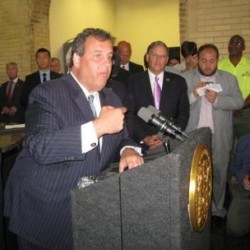New Jersey And Nevada Discuss Interstate Poker Compact

According to a recent article written by Howard Stutz from the Las Vegas Review-Journal, New Jersey Governor Chris Christie (photo) and Nevada Gov. Brian Sandoval have recently been discussing the possibility of the two states combining their online poker player pools by forming an interstate compact. Governor Christie was hosting a gaming summit in an effort to re-market Atlantic City’s beleaguered casino market, which by the end of this year is expected to decline from twelve casinos to just seven. Reporting from the meeting, Stutz tweeted the following message:
“When asked about a NJ-Nev Internet gaming pact, @GovChristie says he’s “spoken ” to @GovSandoval about the idea #lvrj .”
States already share progressive slots jackpots
Although Christie’s comment about a potential interstate poker compact took many in the gambling industry by surprise, the move wouldn’t be the first time New Jersey and Nevada would have cooperated in the gambling arena. Last month, for instance, the two states agreed to share some progressive slots jackpots, an idea conceptually similar to combining online poker liquidity.
Nevada/Delaware compact set to launch this year
Furthermore, Nevada has already been working on the requirements necessary for organizing an interstate poker compact having agreed to share its player pools with Delaware sometime this year, or early 2015. After finalizing the landmark agreement, Nevada Governor Brian Sandoval even offered to aid other states set up online poker industries of their own, stating:
“If there are states that don’t have as sophisticated a regulatory structure as we have, that’s something we can offer. If your state doesn’t have the infrastructure, use our capabilities.”
Nevertheless, combining the population of Nevada with 2.8 million people, and Delaware with just 917k, will likely have a minimal effect on the their respective iPoker industries, while New Jersey’s (8.9m people) presence could be a potential game changer.
Partnerships key to success
In the event of a Nevada/Delaware/New Jersey interstate compact it would become easier for the various online poker sites to regularly offer games at different stakes levels, instead of the situation today where lack of liquidity is causing their online poker ecologies to shrink. Case in point, online poker tracking site PokerScout shows New Jersey’s most popular iPoker site Party Borgata has 140 players over a week’s period, while in Nevada that number falls to a mere 95 for WSOP. Delaware has even lower poker traffic numbers and in July the state’s revenues totaled a paltry $31,397.
With the whole greater than the sum of the individual parts, the network effects post-pooling would therefore have the potential to exponentially grow the states’ liquidity of poker players.
New Jersey falls on hard times
In the past, New Jersey shunned the opportunity to combine its iGaming industry with Nevada, a state long considered its closest competitor. Despite seeing its casino revenues plummet from $5.2 billion in 2007 to just $2.8 billion last year, Governor Chris Christie subsequently touted the state’s nascent online gambling industry as a possible cure for Atlantic City’s ills. Unfortunately, initial estimates of more than $1 billion in revenues each year have failed to materialize and by the end of 2014 that number is likely to be nearer to $120 million.
Of course, liquidity is the key to maintaining a thriving online poker environment and even New Jersey, the 11th biggest US state in terms of population, is beginning to realize it cannot support a viable iPoker industry on its own.
40 million people threshold needed
According to pokerupdate, a state needs at least 40 million residents in order to operate a viable online poker industry, based on an anticipation rate of 50 to 100 players per million. This would result in an average traffic of between 2,000 and 4,000 players, and would mean Nevada/Delaware/New Jersey with 12.5 million residents would still need to seek out other partners in the long run.
Interestingly, it would then seem California (38m) would be the only state with the potential to operate alone, while even next biggest states Texas (26m), New York (19.5m), Florida (19.3m), and Illinois (12.87m) would still need to join or form interstate online poker compacts of their own.
Realistic timeline?
While all three regulated states would benefit from an interstate poker compact, there are no real indications as to how seriously New Jersey is considering the potential partnership, or what a realistic timeline would look like.
If New Jersey does form a network with Nevada and Delaware, however, a newly licensed PokerStars would be disadvantaged by not being allowed to operate in the other states on account of its bad actor label. Meanwhile, Caesars and 888 would enjoy a massive advantage in the Garden State, as almost all of the extra liquidity would be almost exclusively for their benefit.









